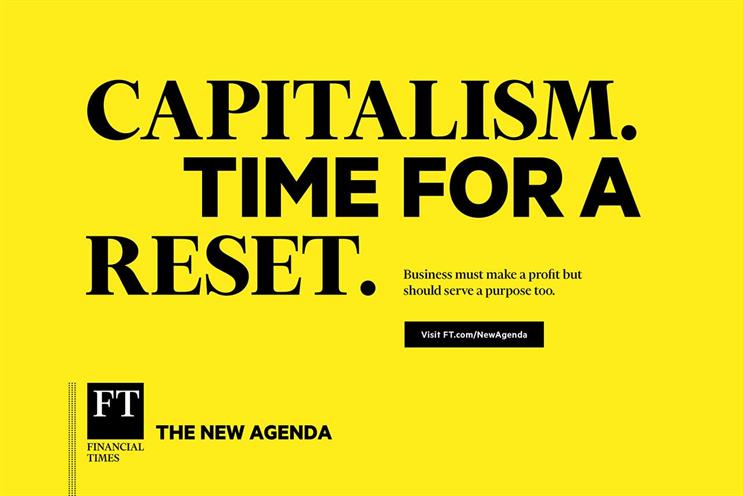
"It is necessary to reform in order to preserve. Today, the world has reached that moment. It is time for a reset."
So said Financial Times editor Lionel Barber, explaining the intention behind the newspaper’s biggest brand campaign since the 2008 global downturn. With those words, Barber was signalling a new chapter not only for the publication, but also for the entire capitalist system.
The FT’s campaign is called "The new agenda" and sets out the newspaper’s belief in free enterprise capitalism. Massive disruptions in business, politics and culture have forced the FT, like other media outlets, to evolve its brand and what it stands for. "The new agenda" is the publication’s answer to that soul-searching, as well as a rallying cry to business leaders to help change the world.
"If you look back in history at when things have changed, it’s often when business gets involved that you begin to see real impact," Finola McDonnell, the FT's chief communications and marketing officer, said. "We’re encouraging people to get involved before it’s too late."
A lot has changed since the FT’s last major campaign in 2008. At the time, the global financial crisis was in full swing and "literally everybody in our sphere of influence and readership was thinking about it", McDonnell recalled. The newspaper’s tagline, "We live in financial times", captured the spirit of that tumultuous era of bank bailouts, company restructures and austerity measures.
More than a decade later, "we’re finally into the post-crisis era properly", McDonnell said. But this period presents its own immense challenges.
"This era is very fragmented. It doesn’t feel like the world has recovered in a way that feels totally coherent. We’ve descended into a new phase of disruption," she continued. "It’s quite intimidating in many respects for the public, people in business and politicians. We felt the time was right to capture the spirit of that new normal."

The FT itself reached a significant milestone this year. As one of the first newspapers to introduce a paywall (in 2002) and challenge the model of free online content, it hit an all-time high of one million paying readers in April – a year ahead of schedule. Digital subscribers now account for more than three-quarters of its circulation.
Like other brands that have had to transform to survive in the digital age, "we think of ourselves quite differently now", McDonnell said. The walls have crumbled between the 131-year-old newspaper and its readers.
"Traditionally, we made a huge success from being a very serious, authoritative brand," she explained. "We’re no longer in a one-way communication with readers. We still think of ourselves as a brand of record, but we’re more of an engagement tool and two-way communication opportunity for those in influence. We’re a catalyst for conversation, rather than just this very authoritative brand that tells people how it is."
The FT is not the only traditional media outlet rethinking its position, of course. Days after it unveiled "The new agenda" in September, The Guardian launched its own brand campaign – its biggest in seven years. Created by Uncommon Creative Studio, The Guardian’s effort uses the strapline "Hope is power" and a similar bright shade of yellow chosen for one of the FT’s ads – a colour of energy and optimism.
Facing so much upheaval in their business models and wider culture, newspapers need a dose of optimism. George Bryant, founder of The Brooklyn Brothers, the agency behind the FT campaign, said "The new agenda" aims to show "the opportunities that exist" amid disruption. For example, how the rise of automation could concurrently open doors for human creativity.
"We didn’t want to create something that looked negatively at the world and justified our role," he added. "Often, change nowadays is painted as bleak and one-way, but in a free enterprise environment there are green shoots of opportunity if we look at things in the right way."
While The Guardian’s ads take an idealistic tone with a rousing call for hope, the FT’s is more pragmatic. "The new agenda" shares provocative points of view about topics such as air travel, investing money and the role of businesses, calling for a more purposeful and responsible form of capitalism. But along with provoking debate, it will also try to offer answers to those difficult questions.

The FT knows that many of its readers are people of influence, so it is exploring how to "convene some of that brain power", McDonnell said. Since the campaign launched, some subscribers and companies have been in touch to say they support the newspaper’s agenda and want to get involved, she added.
Before the end of the year, the publication will host one or two forums that will bring together its readers and expert journalists to turn the debates raised in the campaign into concrete action. It hopes to build on that momentum in 2020.
"There’s a lot of rhetoric that points out the flaws in society, but who are the people who are going to step up and say I'm going to fix that, here’s an answer to that?" McDonnell said. "We’re trying to give them the confidence. That’s the space we’ve entered into it – setting up parameters and encouraging you to think, but it’s up to you to get on with it."
Along with the ad campaign, the FT is in the middle of an acquisition drive to expand its subscriber base, with an emphasis on increasing younger readers. It also has growth ambitions in the US. In the weeks ahead, the newspaper will start to see whether those subscriber numbers are meeting its ambitions, McDonnell said.
If its efforts are fruitful, the FT could set an example for other brands trying to adapt in the face of unprecedented change. "The business of business has changed and you have to be thinking differently if you want to succeed," McDonnell added.


